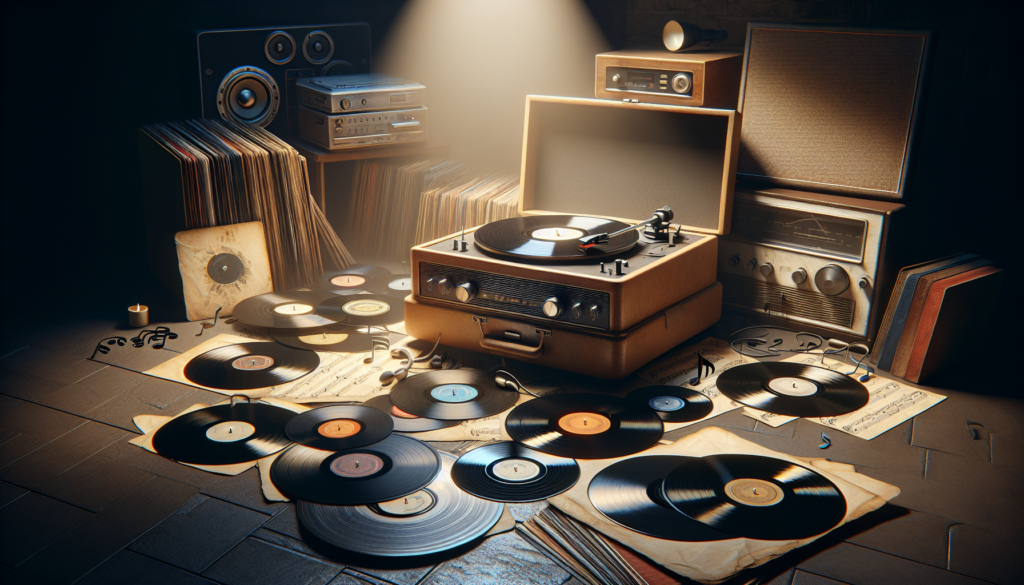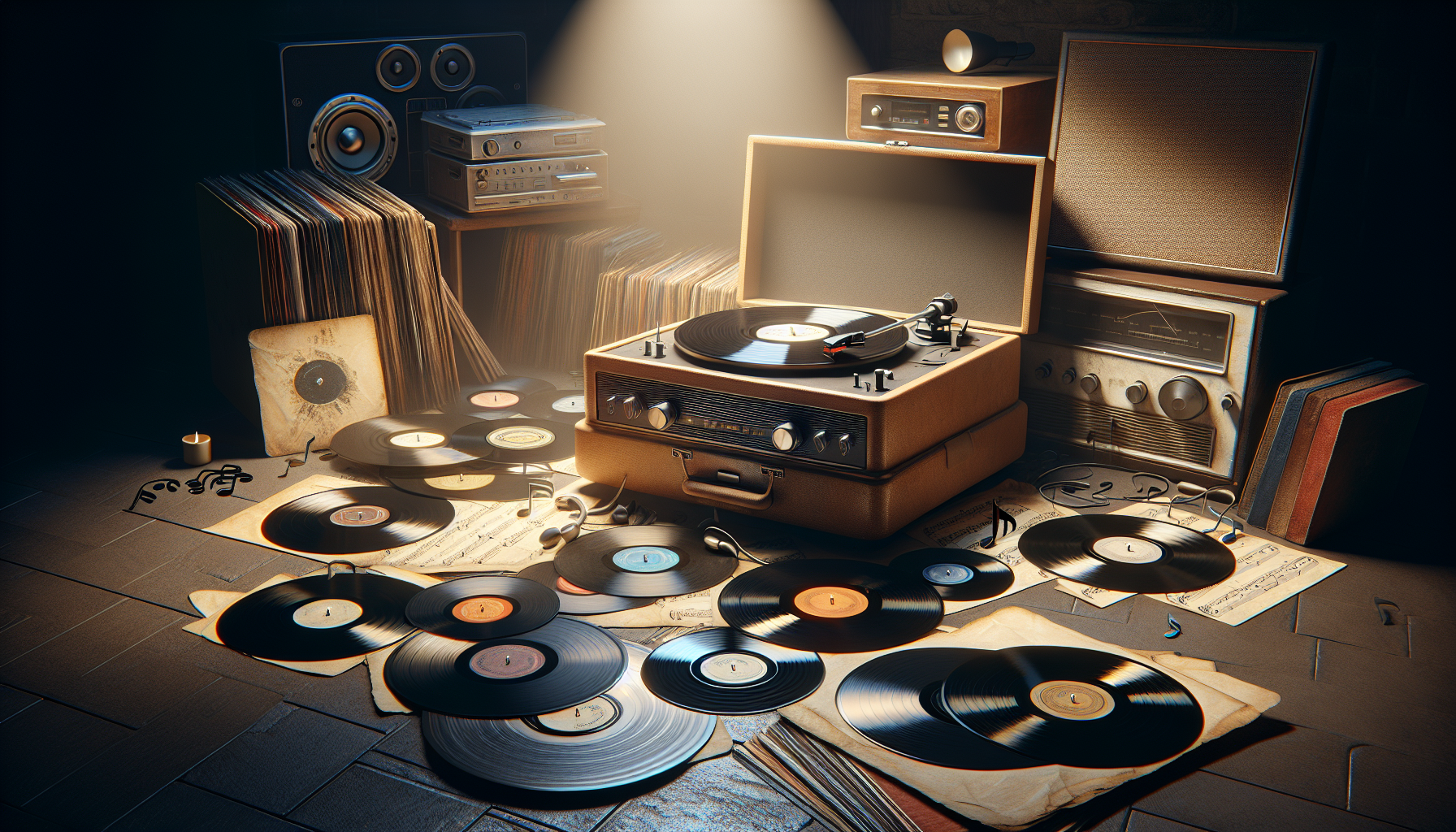If you’ve ever found yourself wondering whether vinyl records are worth listening to, you’re not alone. The resurgence of vinyl in recent years has sparked debate among music enthusiasts. Some argue that the analog sound and tangible experience make it a worthwhile investment, while others believe that digital formats offer convenience and superior sound quality. In this article, we’ll explore the pros and cons of vinyl and help you decide whether it’s worth dusting off that turntable and giving it a spin.

Quality of Sound
Analog Sound
One of the main reasons vinyl records are worth listening to is the unique analog sound they produce. Unlike digital formats, which convert sound waves into binary code, vinyl records capture sound as physical grooves on a record. This analog format allows for a warmer, more organic sound that is often described as rich and vibrant. Vinyl records have a unique way of preserving the natural nuances and imperfections of an artist’s performance, giving listeners a more authentic and immersive experience.
Warmth and Depth
Vinyl records are known for their warmth and depth of sound. The vinyl format has the ability to reproduce low frequencies and intricate details with precision, resulting in a more spacious and layered sound. The organic nature of vinyl allows for a more dynamic and nuanced listening experience, where the subtle nuances of a performance are fully captured and conveyed. This warmth and depth can transport listeners to a different time and place, enhancing the emotional connection to the music.
Dynamic Range
Another advantage of vinyl records is their wider dynamic range compared to digital formats. The dynamic range refers to the difference between the softest and loudest sounds in a recording. Vinyl records can handle a wider range of sound without the distortion and compression often found in digital recordings. This means that listeners can experience the full impact of a song, from the delicate whispers to the soaring crescendos, in a way that digital formats often struggle to replicate. Vinyl records allow for a more nuanced and immersive listening experience, where every subtlety and emotion can be fully appreciated.
Tactile Experience
Physical Interaction
One of the unique aspects of vinyl records is the physical interaction they require. From carefully removing the record from its sleeve, placing it on the turntable, and gently lowering the needle, every step involves a tangible and deliberate action. The act of handling vinyl records adds an element of ritual and engagement to the listening experience. Unlike digital formats where a simple click of a button starts the music, vinyl records demand your attention and active participation, making the listening experience feel more intentional and personal.
Artwork and Packaging
Vinyl records are not just about the audio; they are also about the visual experience. The larger size of vinyl records allows for more intricate and detailed artwork and packaging. From album covers that double as works of art to elaborate gatefolds and lyric inserts, vinyl records often come with visually stunning designs that complement the music. The combination of art and music on vinyl records adds another layer of appreciation and makes owning physical copies a unique and cherished experience.
Collectibility
Vinyl records have a significant collectible value that digital formats cannot replicate. The limited production runs, special editions, and variant pressings make vinyl records highly sought after by collectors. Owning a vinyl record becomes not just about the music but also a part of a larger collecting culture. The exclusivity and scarcity of certain vinyl releases create a sense of excitement and anticipation among collectors, adding to the overall appeal and value of vinyl records.
Nostalgia and Sentiment
Historical Connection
Vinyl records have a deep historical connection that invokes a sense of nostalgia. For many, vinyl represents a bygone era, a time when physical music formats were the norm. Listening to vinyl records can transport listeners back to their youth or connect them to a time they never experienced firsthand. The crackling of the needle on the record and the sound of spinning vinyl evoke a strong sense of nostalgia, reminding us of a simpler time and creating a unique emotional connection to the music.
Emotional Attachment
Vinyl records have the power to create a strong emotional attachment due to their physicality and the memories associated with them. The act of flipping through record bins, discovering hidden treasures, and bringing home a new addition to your collection creates a sense of anticipation and excitement. The physical presence of vinyl records makes them more tangible and personal, allowing listeners to forge a deeper emotional connection with the music and the artist.
Connecting Generations
Vinyl records have the ability to bridge generational gaps and create connections between different generations of music lovers. Sharing a record collection and discussing favorite albums can facilitate conversations and understanding between parents and children, grandparents and grandchildren. Vinyl records have a timeless appeal that transcends generations, allowing younger listeners to discover and appreciate the music that shaped the past while also exploring their own musical preferences. The act of passing down vinyl records from one generation to another creates a lasting legacy and shared love for music.
Album Selection
VINYL EXCLUSIVE Releases
Vinyl exclusives refer to albums that are released solely in vinyl format without a digital or CD counterpart. These vinyl-only releases often attract collectors and enthusiasts due to their limited availability. Artists and record labels sometimes choose to release albums exclusively on vinyl to preserve the authenticity and uniqueness of the format. These vinyl exclusives offer a special listening experience that cannot be replicated by other formats, making them highly desirable among vinyl enthusiasts.
Original Pressings
Original pressings are the initial batch of vinyl records manufactured when an album is released. These pressings-often referred to as “first pressings”-are highly valued by collectors due to their historical significance. Original pressings often come with unique characteristics, such as different mixes, mastering, or alternate artwork. Owning an original pressing not only allows listeners to experience the music as it was intended but also adds a sense of authenticity and connection to the artist’s original vision.
Limited Editions and Special Editions
Vinyl records often come in limited and special editions, which increase their desirability and collectability. These limited and special editions can include unique vinyl colors, deluxe packaging, bonus tracks, or even signed copies. Collectors and enthusiasts seek out these special editions to add to their collections, as they provide an opportunity to own something truly unique and exclusive. Limited editions and special editions make the process of selecting vinyl records an exciting and rewarding experience, with the added benefit of owning a rare and valuable piece of music history.
Listening Rituals
Purposeful Listening
Vinyl records promote purposeful and focused listening. Unlike digital formats, where music can be easily skipped or shuffled, vinyl records encourage listeners to engage with the music as a complete work. The act of choosing an album, placing it on the turntable, and committing to listening from start to finish cultivates a sense of intentionality and deepens the connection to the music. Vinyl records demand your attention and create a dedicated space for uninterrupted listening, allowing you to fully immerse yourself in the sonic journey.
Slowing Down
In a fast-paced world where instant gratification is the norm, vinyl records provide a counterbalance by promoting a slower and more deliberate listening experience. The process of handling vinyl records-the delicate handling, cleaning, and mindful placement on the turntable-requires patience and carefulness. This physical engagement with the music encourages listeners to slow down, take a break from the hustle and bustle, and savor the moment. Vinyl records offer a respite from the constant rush and allow you to fully appreciate the music at a slower pace.
Mindful Engagement
Vinyl records demand active and engaged listening. The act of flipping the record to the other side, cleaning the vinyl surface, and carefully lowering the needle requires your full attention. This mindfulness extends to the listening experience itself, as vinyl records encourage you to actively engage with the music. The analog nature of vinyl creates a deeper connection to the music, as the sound is physically etched into the grooves of the record. This mindfulness and engagement heighten the overall listening experience, allowing you to fully absorb the music and appreciate its subtleties.
Resurgence of Vinyl
Increasing Sales
In recent years, vinyl records have experienced a significant resurgence in sales. According to industry reports, vinyl sales have been steadily increasing, with vinyl record sales surpassing CDs for the first time in decades. This resurgence can be attributed to several factors, including the appeal of physical media, the desire for a more tangible and authentic listening experience, and the overall aesthetic value of vinyl records. The increasing sales of vinyl records indicate a growing appreciation for the format and a shift towards a more intentional and conscious way of consuming music.
Growing Market
Vinyl records are not just for niche collectors anymore; they have entered the mainstream market. Record stores are popping up in cities around the world, and vinyl sections are expanding in retail stores. The growing market for vinyl records demonstrates a broader interest in the format and an increasing number of people discovering or rediscovering the joys of vinyl. This expansion of the market means that more titles are being released on vinyl, offering a wider selection for enthusiasts and creating a vibrant and diverse vinyl community.
Popularity Among Younger Generations
Contrary to popular belief, vinyl records are not just for older generations. Vinyl’s resurgence has been particularly notable among younger listeners. Many millennials and Gen Z individuals have embraced vinyl records as a way to connect with the past and experience music in a different way. The physicality and tangibility of vinyl records appeal to younger generations who have grown up in a digital age. Vinyl records provide a break from the constant stream of digital music and offer a more intentional and immersive listening experience. Their popularity among younger generations points towards a lasting revival of vinyl records.
Artistic Expression
Meticulous Production
Vinyl records offer artists and producers a canvas for meticulous production. The process of mastering for vinyl involves careful consideration of the record’s limitations and unique characteristics. From adjusting the dynamic range to ensuring the optimal frequency response, mastering for vinyl requires technical expertise and a keen understanding of the format. Artists and producers who choose vinyl as their medium of choice often put in extra care and attention to detail, resulting in a more refined and sonically pleasing end product.
Album as a Whole
Vinyl records encourage artists to create cohesive and cohesive albums as a whole. With vinyl’s limited run-time per side, artists and producers have to carefully curate the tracklist and consider the overall flow of the album. This format encourages a more thoughtful and deliberate approach to album creation, where each song contributes to the overarching narrative or concept. Vinyl records reward artists who take the time to craft a complete listening experience, allowing listeners to fully immerse themselves in the artist’s intended vision.
Artist’s Intended Format
Many artists and musicians have a specific vision in mind when creating their music, and vinyl records often align with this intended format. Vinyl’s unique sound characteristics, physicality, and visual appeal provide artists with a medium that best represents their artistic vision. Artists who release their music on vinyl recognize the importance of the format in conveying their intended sonic and visual experience. Listening to an album on vinyl allows you to hear the music as the artist intended, adding an extra layer of authenticity and connection to the artist’s creative process.
Longevity and Durability
Lifespan of Vinyl
Vinyl records have stood the test of time and have proven to be incredibly durable. When properly cared for, vinyl records can last for decades or even generations. Unlike digital formats that may become obsolete or degraded over time, vinyl records retain their sound quality and can withstand the test of time. The physical nature of vinyl ensures that it remains a viable audio format for years to come.
Resistance to Digital Degradation
Digital formats are susceptible to degradation over time due to file corruption or changes in technology. Vinyl records, on the other hand, are analog and not reliant on digital technology. This means that vinyl records do not suffer from the same issues of digital degradation. The sound quality of a vinyl record remains intact, regardless of technological advancements or changes in audio formats. Vinyl records offer a sense of permanence and stability that digital formats cannot replicate.
Collector’s Value
The longevity and durability of vinyl records contribute to their collector’s value. Vinyl records that are well-preserved and in excellent condition often appreciate in value over time. Rare or sought-after records can command high prices in the collector’s market, making vinyl records a valuable investment for collectors. The collector’s value adds an additional layer of appeal to vinyl records, as they not only provide a listening experience but also serve as a tangible and valuable asset.
Sampling and Music Production
Vinyl Sampling
Vinyl records have played a significant role in music production and sampling. Many hip-hop producers and electronic musicians utilize vinyl records as a source for samples and inspiration. The analog sound and inherent warmth of vinyl records add a unique character to sampled material, giving it a vintage and organic feel. Vinyl sampling allows producers to create music with a nostalgic and timeless quality, while also paying homage to the artists and genres that came before.
Authentic Sound
Vinyl records offer an authentic sound that cannot be replicated by digital samples or virtual instruments. The process of sampling from vinyl adds a layer of authenticity and realism to the final production. The imperfections and nuances found in vinyl recordings, such as crackles, pops, and surface noise, contribute to the overall sonic texture and character of the sampled material. Using vinyl samples allows producers to create music with a sense of history and depth, elevating the authenticity and richness of their productions.
Creative Limitations
Vinyl records impose creative limitations that can inspire musicians and producers to think outside the box. The limited run-time per side, the physical constraints of the vinyl format, and the need for meticulous production all require creative problem-solving. These limitations can lead to unique and innovative approaches to music production, resulting in compositions that are specifically tailored to the vinyl format. Vinyl records foster creativity and push artists to explore new possibilities within the boundaries of the medium.
Audio Fidelity and Mastering
Mastering for Vinyl
Mastering for vinyl requires a different approach compared to digital or CD mastering. The physical nature of vinyl records and the limitations of the format necessitate specific adjustments during the mastering process. These adjustments include optimizing the dynamic range, adjusting the frequency response, and ensuring proper groove spacing. Mastering for vinyl involves careful consideration of the format’s characteristics to ensure the best possible sound quality and playback experience on vinyl. The tailored mastering process allows vinyl records to maintain their unique sound characteristics and deliver impeccable audio fidelity.
True Reproduction
Vinyl records offer a true reproduction of the original recording, capturing the essence of the artist’s performance. The analog nature of vinyl allows for a more faithful representation of the music, preserving the dynamic range and intricate details that may be lost in digital formats. Vinyl records provide a closer approximation to the live performance, creating a more authentic and true-to-life listening experience. True reproduction on vinyl ensures that listeners can fully appreciate the artistry and skill of the musicians.
Avoiding Loudness War
Vinyl records offer a respite from the loudness war that often plagues digital formats. The loudness war refers to the practice of increasing the volume of recordings to compete in a loudness-driven market. Vinyl’s limited dynamic range encourages a more balanced and natural mastering approach, as the format cannot handle excessive compression and loudness. This avoidance of the loudness war results in a more dynamic and nuanced listening experience on vinyl, where the full impact of the music can be appreciated without sacrificing the subtleties and dynamics of the original recording.
In conclusion, vinyl records are undoubtedly worth listening to, offering a unique and immersive listening experience that cannot be recreated by digital formats. The quality of sound, tactile experience, nostalgia and sentiment, album selection, listening rituals, and the resurgence of vinyl all contribute to the enduring appeal of vinyl records. Vinyl offers a warmth, depth, and dynamic range that digital formats struggle to replicate, providing a more authentic and engaging listening experience. The physical interaction, artwork, and collectibility of vinyl records add a tangible and personal element to the music, creating a deeper emotional attachment. The historical connection, emotional nostalgia, and ability to connect generations make vinyl records a powerful cultural artifact. Vinyl’s growing market, popularity among younger generations, and unique artistic expression make it a format that is here to stay. The longevity and durability of vinyl, along with its collector’s value, provide a sense of permanence and value that digital formats lack. Vinyl sampling, music production, audio fidelity, and mastering further enhance the appeal of vinyl records, offering a true reproduction of the artist’s vision. Vinyl records deserve a place in the music landscape for their ability to deliver a truly unparalleled and timeless listening experience.

